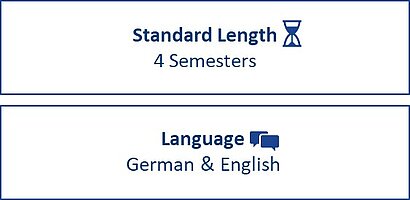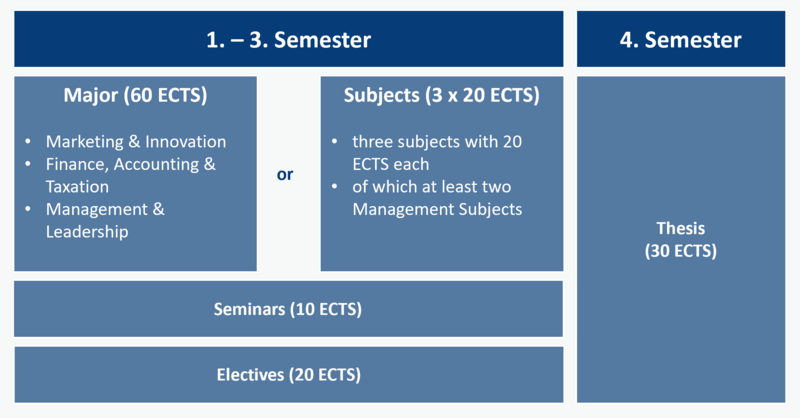Master of Science in Management
Management (M.Sc.)
The Master's degree programme in Management provides you with the basis for the application and development of independent ideas and projects in a research-oriented manner. The teaching of the most important theories and models also enables you to gain a critical understanding of economic issues.
Thanks to the flexible design and individual specialisation, you can tailor your studies to your wishes and prepare yourself optimally for your career aspirations.
Apply now!
The Master's degree programme in Management is characterised by a wide range of specialisation options. Depending on your individual professional and career aspirations, you can choose between individual specialisation areas and thus adapt the degree programme to your needs as much as possible.
You can choose between one major specialisation (major) (60 ECTS credits) or three minor specialisations (subjects) (20 ECTS credits each).
If you choose a major, you will have to complete a total of 60 ECTS credits in one of the three specialisations listed. You can choose between the following specialisations:
Target group
Are you passionate about finance or accounting? Then the FACT major could be the right choice for you.
You should have a solid grounding in business and economics, good statistical, mathematical and microeconomic knowledge and a good to very good command of German and English.
Contents
The academic disciplines of corporate finance, accounting and taxation are theoretically and methodologically interlinked. For example, information and incentive problems as well as tax effects must always be taken into account when making investment and financing decisions or when valuing companies. The data for these decisions comes from internal or external accounting. The effects of these decisions are in turn reflected in the accounting.
In the core area of this major, you will be taught the theoretical and methodological foundations: Portfolio and Capital Market Theory; Tax Policy; Tax Planning Group Accounting or Coordination, Budgeting and Incentives in Organisations are available for you to choose from.
Building on this, you can select modules totalling 40 ECTS credits from an extensive range of courses in the core electives area. A detailed list of the available modules can be found in the subject-specific regulations.
Expertise and career
Specialising in Finance, Accounting & Taxation opens up a wide range of career opportunities in the world of finance. Whether in management consulting, auditing, controlling or taxation - graduates are sought-after experts for strategic financial decisions. The Master's also qualifies you for management positions and creates ideal conditions for professional certifications and further training, such as tax consultant.
Target group
Would you like to conquer the business world? And acquire important core competences in the areas of marketing, entrepreneurship and innovation management? Then the Marketing & Innovation major is the right choice for you!
You should have a solid grounding in business and economics, good statistical, mathematical and microeconomic skills and a good to very good command of German and English. The major can be studied entirely in English.
Contents
The major is aimed at students who are enthusiastic about the diverse possibilities of digitalisation, whether as the founder of their own start-up or in a position of responsibility in an established company. If you want to analyse and design processes, this is the right place for you.
In the core area of this major, you will be taught the theoretical and methodological foundations: You can choose from Marketing Analytics, Corporate Entrepreneurship and Innovation, E-Business Strategies or Market Research.
Building on this, you can select modules totalling 40 ECTS credits from an extensive range of courses in the core electives area. A detailed list of the available modules can be found in the subject-related regulations.
Expertise and career
Students learn to analyse the different facets of digital technologies and to systematically distinguish between different options for action.
Target group
Are you interested in the classic topics of corporate management? Would you like to take on management responsibility later on, perhaps even in your own company? Do you like to analyse and work in a structured and goal-oriented manner? Then the Management & Leadership major could be just right for you.
The Management and Leadership major is aimed at students who enjoy analysing and critically examining theories, models and data with a focus on corporate management. A high level of interest in interdisciplinary scientific findings, an independent way of working and a good command of English are advisable. The major can be studied entirely in English.
Contents
The Management & Leadership major combines classic content from the areas of management and leadership with competences in theoretical, quantitative and qualitative methods, as well as case studies.
In the core area of this major, you will be taught the theoretical and methodological foundations: Incentives in organisations, corporate strategy, labour market economics or market research are available for you to choose from here.
Building on this, you can select modules totalling 40 ECTS in the core electives from an extensive range of courses in the areas of human resource management, entrepreneurship, marketing and labour market economics. You can find a detailed list of the modules available for selection in the subject-specific regulations.
Expertise and career
Students acquire comprehensive knowledge in the field of management and leadership and related academic disciplines. They acquire the necessary competences and skills to make independent, well-founded decisions in companies or to set up their own company. Graduates have a wide range of career prospects and acquire strategic, organisational and communication skills to lead teams, shape change processes and make sustainable decisions.
If you decide to choose three subjects, you must complete 20 ECTS per subject (60 ECTS in total). You can choose from a wide range of subjects from the fields of Management and Economics. However, at least two of these three subjects must be from the field of Management Subjects.
- Marketing
- Corporate Finance and Risk Management
- Human Resource Management and Organization
- Strategic Entrepreneurship
- Managerial Accounting
- Logistics and Supply Chain Management
- Strategic Corporate Communication
- Econometrics
- Taxation
- Accounting
- Enterprise Systems
- Business Analytics
- Electronic Business
- Artificial Intelligence
- Data Science in Decision-Making
As part of the Master's degree programme in Management, a seminar paper must be written in preparation for the Master's thesis. This can be written at a department of your choice from the second semester onwards.
In addition to the specialisation area (Major or Subjects) and the seminar paper, 20 ECTS are also earned in the Electives area. This area offers the opportunity to introduce more individuality into the course of study and to have further courses outside the specialisations and achievements from abroad credited.
Towards the end of your degree programme, you will write your Master's thesis (30 ECTS credits) at a department of your choice. The thesis takes a total of six months to complete.
Application & Enrollment
You need the following ECTS credits to apply for the Master's degree programme in Management:
- 20 ECTS credits from the field of methods (mathematics, statistics, econometrics and applied data-oriented methods, e.g. data science, business analytics, data analysis)
- 60 ECTS credits from the field of management and economics
The exact wording of the admission requirements can be found in the Subject-Specific Provisions Master Management.
More information on how to apply can be found on the Application info page.

A semester abroad is a great opportunity to gain international study experience, get to know other cultures and broaden your personal horizons.
During your studies, you have the opportunity to spend a semester abroad in the second half of your degree programme. You can choose from our numerous partner universities in other European and non-European countries.
Further information on the semester abroad can be found on the International page.
An exchange is not compulsory in this degree programme.
Study regulations: Valid from the winter semester 2026/27 in German language.
Subject description: Valid from the winter semester 2024/25 in English language.
Module handbook: Valid from the winter semester 2024/25 in English language.









